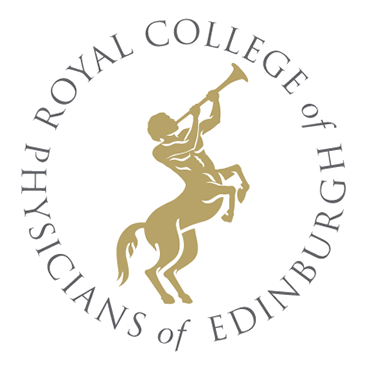
The Consultation Letters of Dr William Cullen (1710-1790) at the Royal College of Physicians of Edinburgh
[ID:557] From: Dr William Cullen (Professor Cullen) / To: [ADDRESSEE UNKNOWN] / Regarding: Mrs Wharton (Patient) / 27 May 1782 / (Outgoing)
Reply, 'For Mrs Wharton', whose disease Cullen believes to have been 'all along the nature of an intermittent', making it 'obstinate' and difficult to cure.
- Facsimile
- Normalized Text
- Diplomatic Text
- Metadata
- Case
- People
- Places
Facsimile
There are 5 images for this document.
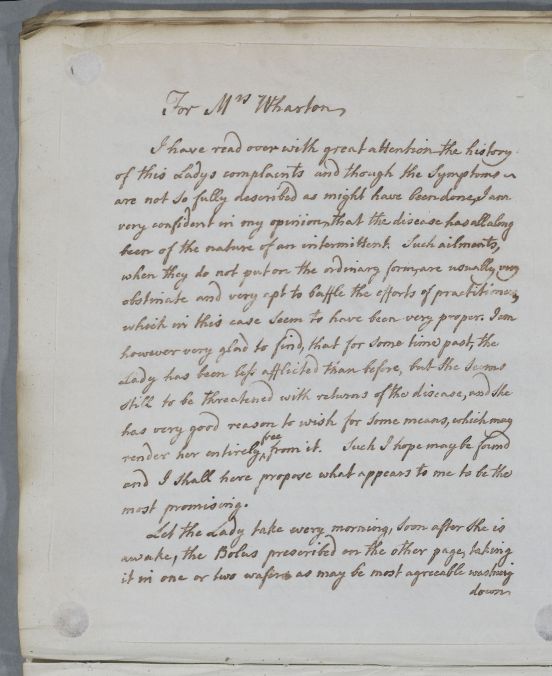
[Page 1]
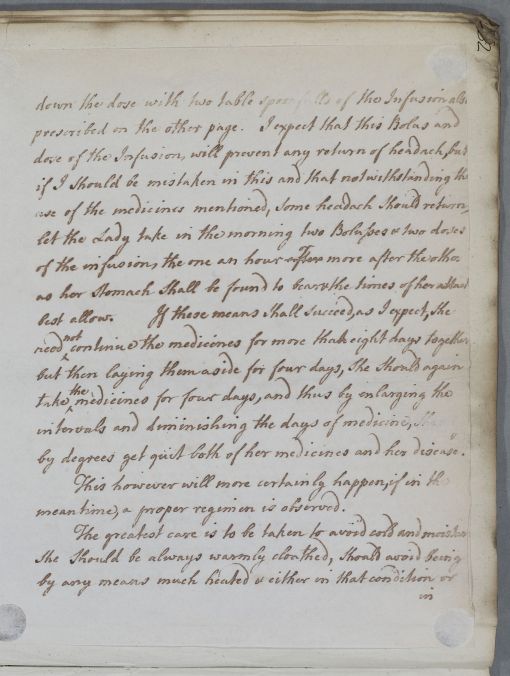
[Page 2]
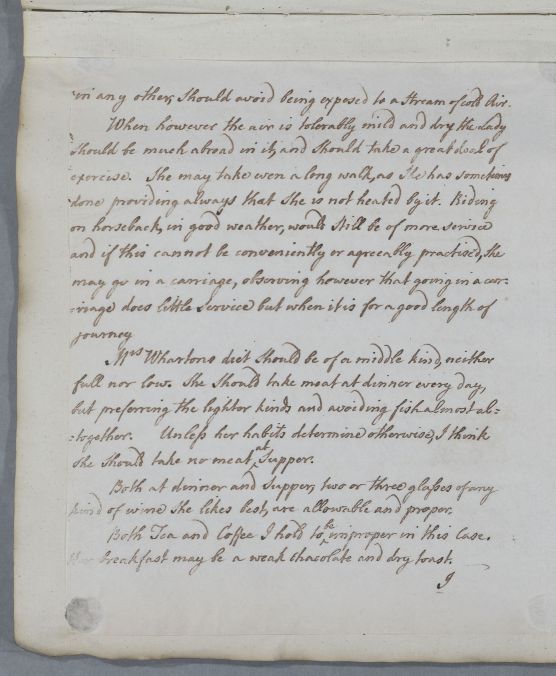
[Page 3]
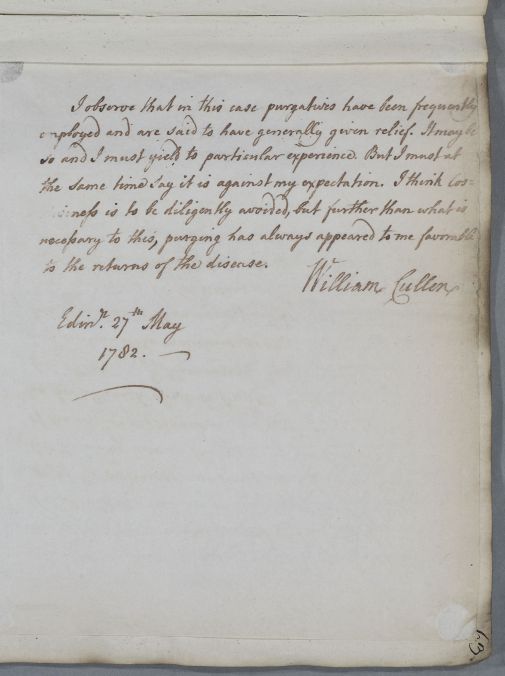
[Page 4]
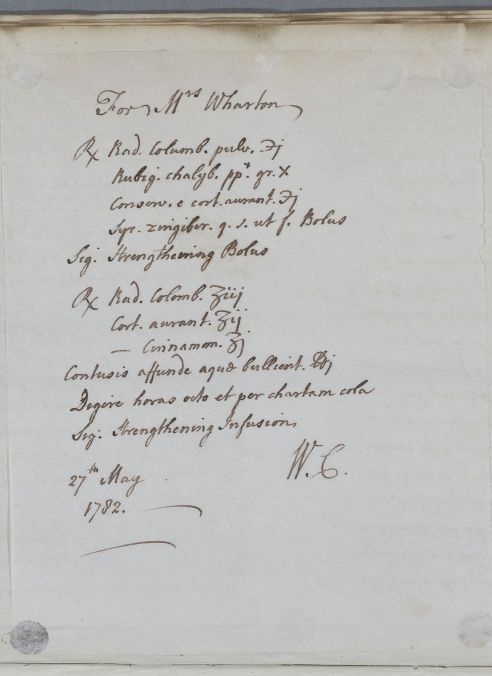
[Page 5]
Metadata
| Field | Data |
|---|---|
| DOC ID | 557 |
| RCPE Catalogue Number | CUL/1/1/15/39 |
| Main Language | English |
| Document Direction | Outgoing |
| Date | 27 May 1782 |
| Annotation | None |
| Type | Machine copy |
| Enclosure(s) | Enclosure(s) present |
| Autopsy | No |
| Recipe | Yes |
| Regimen | Yes |
| Letter of Introduction | No |
| Case Note | No |
| Summary | Reply, 'For Mrs Wharton', whose disease Cullen believes to have been 'all along the nature of an intermittent', making it 'obstinate' and difficult to cure. |
| Manuscript Incomplete? | No |
| Evidence of Commercial Posting | No |
Case
Cases that this document belongs to:
| Case ID | Description | Num Docs |
|---|---|---|
| [Case ID:1462] |
Case of Mrs Wharton who has headaches and a fever. |
4 |
People linked to this document
| Person ID | Role in document | Person |
|---|---|---|
| [PERS ID:1] | Author | Dr William Cullen (Professor Cullen) |
| [PERS ID:3501] | Patient | Mrs Wharton |
| [PERS ID:1] | Patient's Physician / Surgeon / Apothecary | Dr William Cullen (Professor Cullen) |
Places linked to this document
| Role in document | Specific Place | Settlements / Areas | Region | Country | Global Region | Confidence |
|---|---|---|---|---|---|---|
| Place of Writing | Cullen's House / Mint Close | Edinburgh | Edinburgh and East | Scotland | Europe | certain |
Normalized Text
For Mrs Wharton
I have read over with great attention the history
of this Ladys complaints and though the symptoms -
are not so fully described as might have been done, I am
very confident in my opinion, that the disease has all along
been of the nature of an intermittent. Such ailments,
when they do not put on the ordinary form, are normally very
obstinate and very apt to baffle the efforts of practitioners,
which in this case seem to have been very proper. I am
however very glad to find, that for some time past, the
Lady has been less afflicted than before, but she seems
still to be threatened with returns of the disease, and she
has very good reason to wish for some means, which may
render her entirely ↑free↑ from it. Such I hope may be found
and I shall here propose what appears to me to be the
most promising.
Let the Lady take every morning, Soon after She is
awake, the Bolus prescribed on the other page, taking
it in one or two wafers as may be most agreeable washing
[Page 2]
down the dose with two table spoonfulls of the Infusion also
prescribed on the other page. I expect that this Bolus and
dose of the Infusion, will prevent any return of headach, but
if I should be mistaken in this and that notwithstanding the
use of the medicines mentioned, some headach Should return,
let the Lady take in the morning two Bolusses & two doses
of the infusions the one an hour after (↑or↑) more after the other
as her Stomach shall be found to bear & the times of her {illeg}
best allow. If these means shall succeed, as I expect, she
need ↑not↑ continue the medicines for more than eight days together
but then laying them aside for four days, she should again
take ↑the↑ medicines for four days, and thus by enlarging the
intervals and diminishing the days of medicine, she may
by degrees get quit both of her medicine and her disease.
This however will more certainly happen, if in the
meantime, a proper regimen is observed.
The greatest care is to be taken to avoid cold and moisture
She should be always warmly cloathed, should avoid being
by any means much heated or either in that condition or
[Page 3]
in any other, should avoid being exposed to a stream of cold Air.
When however the air is tolerably mild and dry the Lady
should be much abroad in it, and should take a great deal of
exercise. She may take even a long walk, as she has sometimes
done providing always that she is not heated by it. Riding
on horseback, in good weather, would still be of more service
and if this cannot be conveniently or agreeably practised, She
may go in a carriage, observing however that going in a car¬
riage does little service but when it is for a good length of
journey.
Mrs Whartons diet should be of a middle kind, neither
full nor low. She should take meat at dinner every day,
but preferring the lighter kinds and avoiding fish almost al¬
together. Unless her habits determine otherwise, I think
she should take no meat ↑at↑ supper.
Both at dinner and supper, two or three glasses of any
kind of wine she likes best, are allowable and proper.
Both Tea and Coffee I hold to ↑be↑ improper in this Case.
Her breakfast may be a weak chacolate and dry toast.
[Page 4]
I observe that in this case purgatives have been frequently
employed and are said to have generally given relief. It may be
so and I must yield to particular experience. But I must at
the same time say it is against my expectation. I think Cos¬
tiveness is to be diligently avoided, but further than what is
necessary to this, purging has always appeared to me favorable
to the returns of the disease.
Edinburgh 27th May
1782. --
[Page 5]
For Mrs Wharton
Take one scruple of powdered Columbo Root prepare ten grains of Red chalybeate conserve with one scruple of orange peel with Syrup of ground ginger sufficient to make into a Bolus Label: Strengthening Bolus
Take three drachms of Columbo Root two drachms of orange peel one drachm of Cinnamon Bark Pour one pound of boiling water over the bruised material and strain for a few hours through a piece of paper Label: Strengthening Infusion
27th May
1782. ---
Diplomatic Text
For Mrs Wharton
I have read over with great attention the history
of this Ladys complaints and though the symptoms -
are not so fully described as might have been done, I am
very confident in my opinion, that the disease has all along
been of the nature of an intermittent. Such ailments,
when they do not put on the ordinary form, are normally very
obstinate and very apt to baffle the efforts of practitioners,
which in this case seem to have been very proper. I am
however very glad to find, that for some time past, the
Lady has been less afflicted than before, but she seems
still to be threatened with returns of the disease, and she
has very good reason to wish for some means, which may
render her entirely ↑free↑ from it. Such I hope may be found
and I shall here propose what appears to me to be the
most promising.
Let the Lady take every morning, Soon after She is
awake, the Bolus prescribed on the other page, taking
it in one or two wafers as may be most agreeable washing
[Page 2]
down the dose with two table spoonfulls of the Infusion also
prescribed on the other page. I expect that this Bolus and
dose of the Infusion, will prevent any return of headach, but
if I should be mistaken in this and that notwithstanding the
use of the medicines mentioned, some headach Should return,
let the Lady take in the morning two Bolusses & two doses
of the infusions the one an hour after (↑or↑) more after the other
as her Stomach shall be found to bear & the times of her {illeg}
best allow. If these means shall succeed, as I expect, she
need ↑not↑ continue the medicines for more than eight days together
but then laying them aside for four days, she should again
take ↑the↑ medicines for four days, and thus by enlarging the
intervals and diminishing the days of medicine, she may
by degrees get quit both of her medicine and her disease.
This however will more certainly happen, if in the
meantime, a proper regimen is observed.
The greatest care is to be taken to avoid cold and moisture
She should be always warmly cloathed, should avoid being
by any means much heated or either in that condition or
[Page 3]
in any other, should avoid being exposed to a stream of cold Air.
When however the air is tolerably mild and dry the Lady
should be much abroad in it, and should take a great deal of
exercise. She may take even a long walk, as she has sometimes
done providing always that she is not heated by it. Riding
on horseback, in good weather, would still be of more service
and if this cannot be conveniently or agreeably practised, She
may go in a carriage, observing however that going in a car¬
riage does little service but when it is for a good length of
journey.
Mrs Whartons diet should be of a middle kind, neither
full nor low. She should take meat at dinner every day,
but preferring the lighter kinds and avoiding fish almost al¬
together. Unless her habits determine otherwise, I think
she should take no meat ↑at↑ supper.
Both at dinner and supper, two or three glasses of any
kind of wine she likes best, are allowable and proper.
Both Tea and Coffee I hold to ↑be↑ improper in this Case.
Her breakfast may be a weak chacolate and dry toast.
[Page 4]
I observe that in this case purgatives have been frequently
employed and are said to have generally given relief. It may be
so and I must yield to particular experience. But I must at
the same time say it is against my expectation. I think Cos¬
tiveness is to be diligently avoided, but further than what is
necessary to this, purging has always appeared to me favorable
to the returns of the disease.
Edinr. 27th May
1782. --
[Page 5]
For Mrs Wharton
℞ Rad. Columb. pulv. ℈j
Rubig. chalyb. ppt. gr. x
Conserv. e cort. aurant. ℈j
Syr. zingiber. q.s. ut f. Bolus
Sig. Strengthening Bolus
℞ Rad. Colomb. ʒiij
Cort. aurant. ʒij
-- Cinnamom. ʒj
Contusis affunde aquæ bullient. lbj
Degire horas orto et per chartam cola
Sig: Strengthening Infusion
27th May
1782. ---
XML
XML file not yet available.
Feedback
Send us specfic feeback about this document [DOC ID:557]
Please note that the Cullen Project team have now disbanded but your comments will be logged in our system and we will look at them one day...

